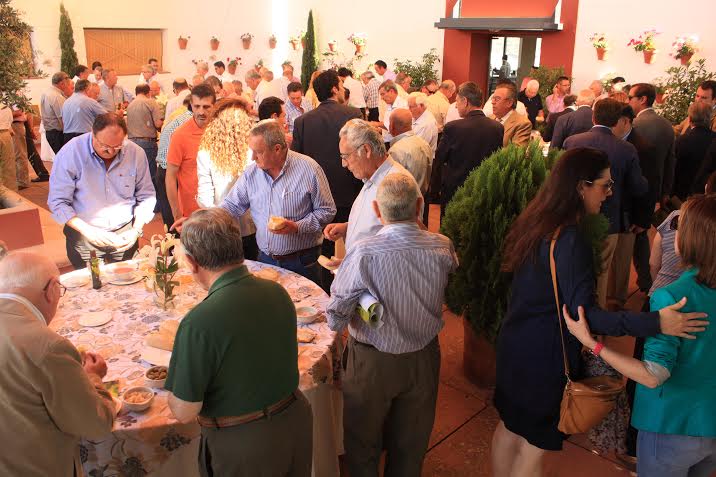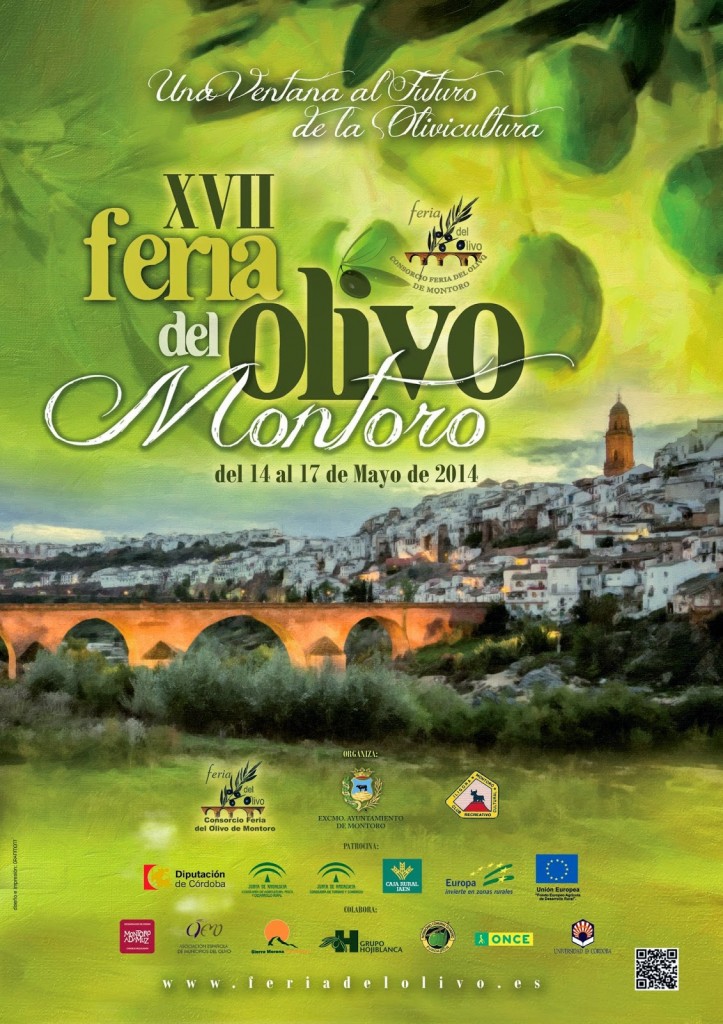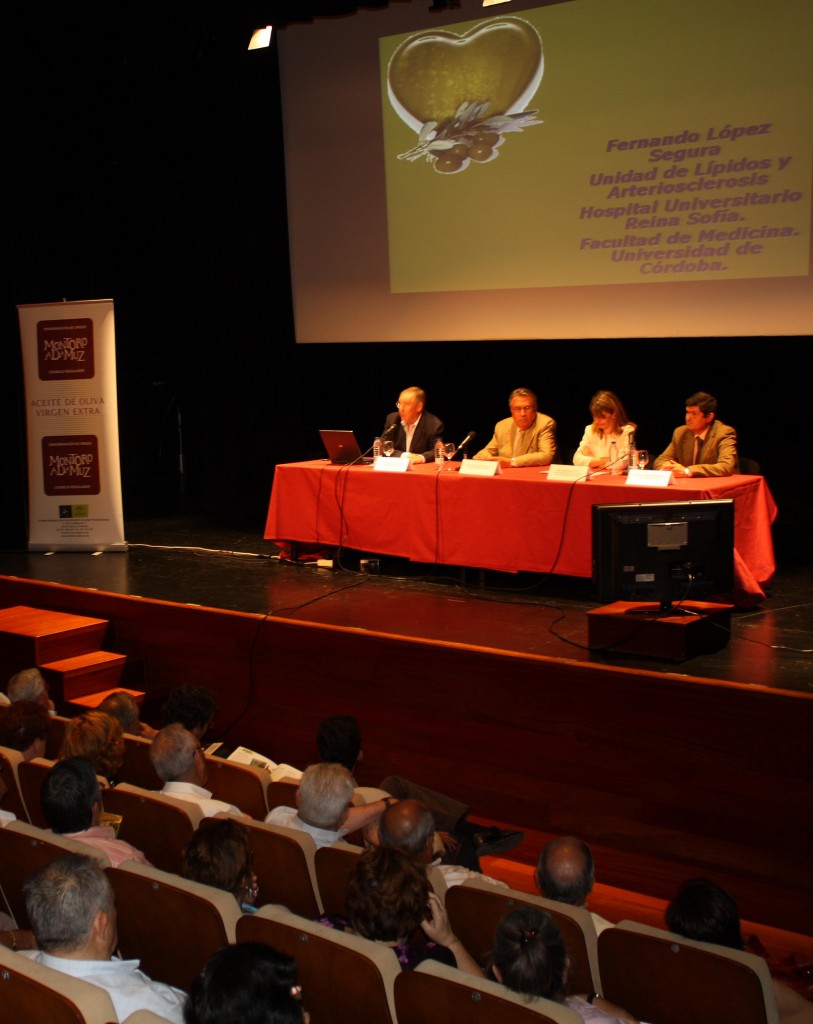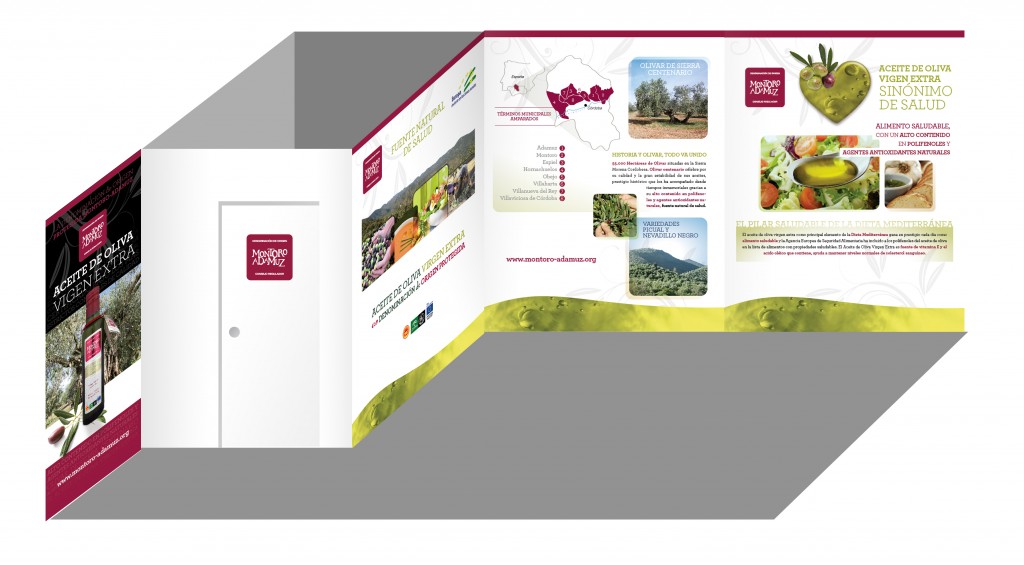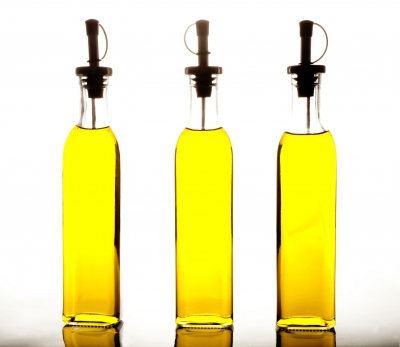Tag Archives: agentes antiox idantes naturales
(Español) Aceites de oliva y mayor esperanza de vida
El AOVE contra la enfermedad intestinal inflamatoria
Entre los recientes descubrimientos sobre los efectos beneficiosos del AOVE y en concreto de sus principios bioactivos y de los polifenoles en particular tenemos resaltar el efecto sobre los procesos inflamatorios que afectan al tubo digestivo. Entre estas enfermedades podemos destacar la Colitis Ulcerosa y la Enfermedad de Crohn. Ambas desarrollan un proceso inflamatorio crónico que normalmente es tratado con antiinflamatorios y anticuerpos dirigidos contra las citocinas proinflamatorias.
El tratamiento actual no cura la enfermedad de la que se desconoce su origen, actualmente se cree que puede ser desencadenada por la infección de algún virus o bacteria no identificado. Por ello es muy difícil buscar un tratamiento efectivo. En la búsqueda de soluciones eficaces se ha investigado el efecto que la dieta tiene sobre estos pacientes. La mayoría de estos estudios se han realizado sobre animales, y en concreto en la Revista Food & Nutrition trata el tema y la conclusión que se deriva es que la mayoría de los polifenoles inhiben las manifestaciones de estas enfermedades ayudando a regular la inflamación y otros parámetros relacionados con la misma.
Algunos componentes fenólicos del aceite de oliva virgen extra como la oleuropeina, hidroxitirosol o el tirosol han demostrado su eficacia en la inflamación intestinal en ratas mejorando otros parámetros. Otro de los estudios concluye que el AOVE también podría ser beneficioso contra la colitis ulcerosa.
Los aceites de oliva virgen extra ricos en polifenoles son los mas beneficiosos para la salud. Complementar una dieta mediterránea equilibrada, con un aove rico en polifenoles y principios bioactivos es muy recomendable ya que ayuda a prevenir multitud de efermedades. En la Denominación de Origen Protegida Montoro – Adamuz llevamos más de 7 años trabajando en esta línea, produciendo los aceites más ricos en polifenoles y por ende fuente natural de salud.
Fuentes:
http://www.infaoliva.com/documentos/boletines/RESUMEN%20DE%20PRENSA%20%20%2026.5.2015.pdf
http://www.ideal.es/jaen/jaen/201505/25/aove-beneficioso-enfermedad-intestinal-20150524195026.html
http://www.cmed.es/enfermedad-inflamatoria-intestinal.php
http://elpais.com/elpais/2015/05/11/ciencia/1431355310_796945.html
El aceite de oliva remedio contra el Parkinson
Ana Rosa Cañuelo Navarro profesora del departamento de Biología Experimental de la Universidad de Jaén e integrante del grupo de investigación “Estrés Celular y Edad” presentó dentro del marco de Expoliva 2015 una investigación que está analizando el efecto neuroprotector de los polifenoles del olivo en la enfermedad de Parkinson.
 El aceite de oliva virgen extra es único entre los aceites vegetales debido a la elevada concentración de compuestos fenólicos que posee, entre los que se incluyen hidroxitirosol, tirosol, oleuropeína, ácido 4-hidroxifenilacético y ácido cafeico, entre otros. Aunque cada vez son más los estudios que ponen de manifiesto las propiedades anticancerígenas, antiinflamatorias, bactericidas y cardioprotectoras de estos compuestos, el interés por sus efectos sobre el envejecimiento o en enfermedades neurodegenerativas es más reciente y existen menos estudios al respecto.
El aceite de oliva virgen extra es único entre los aceites vegetales debido a la elevada concentración de compuestos fenólicos que posee, entre los que se incluyen hidroxitirosol, tirosol, oleuropeína, ácido 4-hidroxifenilacético y ácido cafeico, entre otros. Aunque cada vez son más los estudios que ponen de manifiesto las propiedades anticancerígenas, antiinflamatorias, bactericidas y cardioprotectoras de estos compuestos, el interés por sus efectos sobre el envejecimiento o en enfermedades neurodegenerativas es más reciente y existen menos estudios al respecto.
En concreto el grupo “Estrés Celular y Edad” ha demostrado que uno de estos fenoles simples en concreto el tirosol, puede retrasar el envejecimiento y aumentar la longevidad en un modelo animal mediante la modulación de rutas de señalización específicas. El proyecto se centra en la investigación de los efectos principales de los agentes fenólicos procedentes del olivo cuando se agrega la proteína α-sinucleína, uno de los principales factores que influyen en el desarrollo y en la progresión del Parkinson.
La enfermedad de Parkinson (PD) es el segundo desorden neurodegenerativo en cuanto a prevalencia en la población y se caracteriza por la aparición de movimientos involuntarios, temblores, rigidez muscular y dificultades en el mantenimiento del equilibrio, como consecuencia de la pérdida de neuronas dopaminérgicas en la sustancia nigra del cerebro.
En los últimos años son bastante numerosos los estudios tanto in vitro como in vivo que investigan los efectos de distintos compuestos fenólicos para prevenir el daño neuronal en diversas patologías neurodegenerativas.
 Concretamente, en esta enfermedad algunos de estos compuestos, como la curcumina, poseen un efecto neuroprotector no sólo en modelos animales sino también en humanos. Aunque los mecanismos concretos mediante los que este tipo de moléculas ejercen su acción neuroprotectora aún no están claros, se ha sugerido que éstos podrían estar relacionados con la capacidad para neutralizar especies reactivas de oxígeno y de nitrógeno, con la regulación de rutas de señalización asociadas con la supervivencia celular y la inflamación, así como con la capacidad para inhibir la agregación de proteínas implicadas como la α-sinucleína.
Concretamente, en esta enfermedad algunos de estos compuestos, como la curcumina, poseen un efecto neuroprotector no sólo en modelos animales sino también en humanos. Aunque los mecanismos concretos mediante los que este tipo de moléculas ejercen su acción neuroprotectora aún no están claros, se ha sugerido que éstos podrían estar relacionados con la capacidad para neutralizar especies reactivas de oxígeno y de nitrógeno, con la regulación de rutas de señalización asociadas con la supervivencia celular y la inflamación, así como con la capacidad para inhibir la agregación de proteínas implicadas como la α-sinucleína.
La investigación sigue abriendo camino y demostrando los beneficios de los compuestos fenólicos procedentes del AOVE y de sus efectos saludables. Los aceites de oliva virgen extra de la Denominación de Origen Montoro-Adamuz son los mas ricos en polifenoles y por lo tanto fuente de salud.
Fuente el Ideal de Jaén y Olimerca
Course on the Sensory Analysis of Extra Virgin Olive Oil
One of the professional activities carried out in the framework of the 17th Montoro Olive Tree Trade Fair, and one of the most popular this year, was the Course on the Sensory Analysis of Extra Virgin Olive Oil.
A group of 25 students, consisting of millers and experts from the region’s cooperatives, attended this course at the Hotel Mirador in Montoro.
 The first day, 14th May, was led by Brígida Jiménez Herrera, director of theAndalusian Institute of Agricultural and Fisheries Research and Training (IFAPA) in Cabra, who spoke to the participants about the organoleptic properties of extra virgin olive oil. There was then a tasting of international oils and another of the different varieties and blends of oil.
The first day, 14th May, was led by Brígida Jiménez Herrera, director of theAndalusian Institute of Agricultural and Fisheries Research and Training (IFAPA) in Cabra, who spoke to the participants about the organoleptic properties of extra virgin olive oil. There was then a tasting of international oils and another of the different varieties and blends of oil.
The person responsible for running the second day of the tasting course was José María Horcas, head of the laboratory panel at DCOOP. He explained to the participants the features and characteristics of the extra virgin olive oil from the PDO Montoro-Adamuz and the DO Antequera. After his presentation the students took part in a tasting of the olive oils from those designations of origin.
3rd Technical Workshop of the PDO Montoro-Adamuz
With the involvement of more than 200 people, the 3rd Technical Workshop of the PDO Montoro-Adamuz has been one of the highlights of the 17th Montoro Olive Tree Trade Fair (held from 14th to 17th May 2014). In this edition it focused on the values and future of extra virgin olive oil in our designation of origin.
The first presentation in these workshops, dedicated to professionals from the olive industry, was given by the renowned Doctor Ramón Estruch from the University of Barcelona, manager and coordinator of the PREDIMED Study about the effects of the Mediterranean diet on the prevention of cardiovascular diseases. During his presentation he emphasised the conclusions of this study, which show the benefit of consuming extra virgin olive oil, making it clear that “4 or 5 tablespoons per day does not make you gain weight, but rather improves both good and bad cholesterol”.
Moreover, Teresa Pérez Millán, manager of the Interprofesional del Aceite de Oliva organisation, stressed that the level of polyphenols in extra virgin olive oil is what provides its health benefit. In that regard, she highlighted the advantages of the oil from our designation of origin, one of the richest in polyphenols.
Additionally, Pérez Millán noted the need to promote extra virgin olive oil to tourists in order for them to “appreciate our product”, highlighting the different campaigns being carried out by the “Aceites de España” brand throughout the world.
One of the central themes of the technical workshops was undoubtedly the issue surrounding the Common Agricultural Policy (CAP) and mountain olive groves with natural difficulties, a theme that Rafael Sánchez de Puerta, chairman of the EU Olive Oil Advisory Group, addressed in his speech.
Sánchez de Puerta argued that the “CAP must have a better outlook” and said that to achieve this it will be “essential to develop the Rural Development in Andalusia programme”. As he mentioned, this programme will have a budget of 1,900 million and will be managed by the Rural Development Groups (RDG) of Andalusia, who will surely be committed to the mountain olive grove, one of the hardest hit. He continued by saying that “this type of policy, which covers the period between 2014 and 2020, could be implemented from next year”.
During his presentation, Sánchez de Puerta also emphasised the need for the involvement of companies that position our products in the international market. He stressed that two thirds of the olive grove production is already exported across the world, exceeding our main competitor, Italy. In this regard, he focussed on turning farmers into entrepreneurs through cooperatives, in order to strengthen industrialisation, commercialisation and, therefore, the growth of the industry.
In addition to the aforementioned presentations, others were given by renowned researchers and professionals from industries related to extra virgin olive oil, such as Doctor Francisco Pérez Jiménez, from the lipids unit of the Reina Sofía Hospital in Cordoba.
Similarly, during the technical workshops, those who took part were able to enjoy a healthy breakfast based, of course, on extra virgin olive oil.
Summary of the 17th Montoro Olive Tree Trade Fair
Once again this year, Montoro became the epicentre of the olive oil industry thanks to the 17th Olive Tree Trade Fair, which took place from 14th to17th May.
This is a leading event in the industry and this year 140 companies (17 from foreign countries) took part, of which 132 exhibited their products. Among the stands was the one for PDO Montoro-Adamuz, which each day during the event offered those attending a taste of our extra virgin olive oil.
Beyond the exhibition, the 17th Olive Tree Trade Fair brought together oil experts from many different professional activities, allowing them to pool ideas, proposals and figures, generating a more profitable dialogue.
Among the conclusions reached we can highlight the one explained by Antonio Sánchez Villaverde, chairman of the Olive Tree Trade Fair Consortium, who is committed to “a system for the concentration of cooperatives that brings together all the cooperatives from the Alto Guadalquivir district and would be capable of milling 300 million kilogrammes of olives, cutting costs for the farmers, being competitive and making oil profitable”.
In terms of industrial and technological quality and innovation, this was addressed during the opening ceremony by Elena Víboras, Minister of Agriculture, Fishing and Rural Development at the Government of Andalusia, who stated that the intention of this public body is yet again to ask the national Ministry for aid that includes the traditional sloping olive grove, “the key to ensuring the viability of family farms”.
Víboras also pointed out “the olive oil potential of the province of Cordoba, which has the greatest number of Designations of Origin for olive oil in Andalusia: Montoro-Adamuz, Baena, Lucena and Priego de Córdoba”, being the second largest producer of olive oil in Andalusia and Spain.
In addition to other professional activities, such as the Technical Workshops and the Tasting Course, which we will discuss in more depth in later blog posts, the 17th Olive Tree Trade Fair was the setting chosen to reward the work of the professionals in the olive oil industry with different awards.
For example we have the 8th “Pedro León Mellado” Awards for the Quality of Extra Virgin Olive Oils, whose special prize for the Best extra virgin olive oil from the DO Montoro-Adamuz, has gone to the “Nuestra Madre del Sol” Agricultural Cooperative in Adamuz.
In terms of the Diario Córdoba Montoro Olive Tree Trade Fair Awards 2014, the award for Milling Master was won by Nicolás Carrasco Majuelos, that for Innovation and Development by Pieralisisi, that for Business Initiative by Agrocor and the award for Environmental Protection by CBH Agro.
Moreover, López Garrido was named the best Export Company, Vibradores MAI the best Family Business, and Calero the best stand at the fair. It is worth noting that the award for Social Initiative has remained in Montoro, specifically with the Asociación de Comerciantes Épora (Merchants Association of Épora).
17th Montoro Olive Tree Trade Fair
Next week will see a new edition of the Montoro Olive Tree Trade Fair, an essential date in the international olive oil calendar.
From 14th to 17th May 2014, the town of Montoro will yet again become the capital of extra virgin olive oil with the 17th Olive Tree Trade Fair, focusing on promoting the study of the olive grove and the latest technical advances in this industry.
Highlights among a varied programme include two events: the Course on the Sensory Analysis of Extra Virgin Olive Oil and the 3rdTechnical Workshops of the PDO Montoro-Adamuz.
The Course on the Sensory Analysis of Extra Virgin Olive Oil will take place on the 14th and 15th May 2014 in the Hotel Mirador in Montoro, and will focus on the tasting of olive oils from the designations of origin of Montoro-Adamuz and Antequera.
During the first day of this course, which will begin at 4.30pm with a presentation from Antonio Terán, technical director for our designation of origin, Brígida Jiménez Herrera, director of the Andalusian Institute of Agricultural and Fisheries Research and Training (IFAPA) in Cabra, will talk to the attendees about the organoleptic properties of extra virgin olive oil. There will then be a tasting of international oils and another of the different varieties and blends of oil.
On 15th May it will be the turn of José María Horcas, head of the laboratory panel of DCOOP, whose presentation will focus on the quality of olive oil and the elements that influence this. After his presentation there will be a tasting of oils from the season from Montoro-Adamuz and Antequera.
On that same day, in the Miguel Romero Esteo Municipal Theatre, the 3rd Technical Workshops of the PDO Montoro-Adamuz will start. This edition will focus on the values and future of extra virgin olive oil in our designation of origin.
Those responsible for opening this event, which begins at 9am, areAntonio Sánchez Villaverde, Mayor of Montoro; Francisco Terán Blanco, Chairman of the Governing Board of the PDO Montoro-Adamuz; and Ana María Romero Obrero, Director General of Quality, Agro-food Industries and Ecological Production at the Ministry of Agriculture, Fishing and Rural Development at the Government of Andalusia.
At 9.30am, Doctor Ramón Estruch will present the PREDIMED study titled “Effects of the Mediterranean Diet on the first prevention of cardiovascular disease”, which we recently told you about in this blog.
This presentation will be followed by a round table session “Benefits of olive oil and its polyphenols on health”, which will involve, in addition to Doctor Estruch, Teresa Pérez Millán, manager of the Interprofesional del Aceite de Oliva organisation, and Doctor Francisco Pérez Jiménez, from the lipids unit at the Reina Sofía Hospital in Cordoba.
To recharge the batteries so that we can continue with these intensive days, there is nothing better than a miller’s breakfast including, of course, its olive oil.
After the break it will be the turn of the Chairman of our Governing Board, Francisco Terán Blanco, who will talk to us about the “Present and future of extra virgin olive oil from the PDO Montoro-Adamuz”.
At 12 noon the presentationtitled“The CAP from here to 2020, the mountain olive grove with natural difficulties” will be given by Rafael Sánchez Puerta, Chairman of the EU Olive Oil Advisory Group and Juan Carlos Vega Chacón, coordinator of the subsidies service at DCOOP.
The last session will be titled“New regulation for the sustainable use of plant protection products. Compulsory integrated pest management and the farm register”. Those responsible for giving this will be Pablo Soto Hermoso, Head of Service of the Provincial Delegation of Cordoba of the Ministry of Agriculture, Fishing and Rural Development at the Government of Andalusia; and Francisco Javier Merino Sierra, Director of the District Agricultural Office of Montoro at the same Ministry.
To complete our workshop we will count on the presence of Francisco Zurera Aragón, representative of Agriculture, Fishing and Rural Development at the Government of Andalusia.
However, the 17th Montoro Olive Tree Trade Fair does not end there. Over the days there will be a large number of exhibitions, contests and competitions, all to enhance the value of the cultivation of the olive grove, essential in understanding the history, economic development and day to day life of the town of Montoro, the jewel of the Alto Guadalquivir in Cordoba.
You can find the complete programme for the fair and register on its website: www.feriadelolivo.es
Extra virgin olive oil: a great ally against diabetes
Sometime ago we told you in our blog about the study conducted by the Department of Endocrinology and Nutrition at the Carlos Haya Hospital in Malaga on the role of fat in the diet. This demonstrated, among other noteworthy results, that extra virgin olive oil from the PDO Montoro-Adamuz increased sensitivity to insulin.
Today we want to delve a little deeper into the relationship between extra virgin olive oil and the prevention of certain diseases, such as diabetes.
A new result from the PREDIMED Study (Prevention with Mediterranean Diet) has recently been published in the Annals of Internal Medicine journal, which shows that the Mediterranean diet, supplemented with extra virgin olive oil, reduces the risk of developing diabetes.
The research involved 7,447 people, of whom 3,541 did not suffer from diabetes mellitus at the time of their participation. During the almost five years for which the study lasted, they were subjected to annual analyses to check what percentage began to suffer from this disease when following a Mediterranean diet supplemented with extra virgin olive oil and the results could not have been better: extra virgin olive oil reduces the risk of developing diabetes by 40%.
The coordinator of this study, Doctor Ramón Estruch, acknowledges that, although positive results were expected, the great power of extra virgin olive oil to prevent cardiovascular diseases, in this case diabetes, has been a complete surprise.
So much so that a new study, the PREDIMED Plus, has already been planned, through which the possible beneficial effects of extra virgin olive oil in treating people who are obese and overweight will be looked at in more depth.
If the result is positive it would finally banish the idea that extra virgin olive oil “makes people gain weight”, as is commonly thought. According to Doctor Estruch, the aim is to “demonstrate that a well-balanced diet, which includes extra virgin olive oil, can help people to lose weight and partially prevent the appearance of complications such as heart attacks or strokes”.
He also aims to conduct another study to determine whether following the Mediterranean diet supplemented with extra virgin olive oil can also contribute to preventing the appearance of certain types of cancer.
With figures as positive as these, we cannot be prouder of contributing to the promotion of such a healthy food as the extra virgin olive oil from the PDO Montoro-Adamuz.










